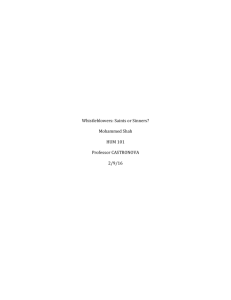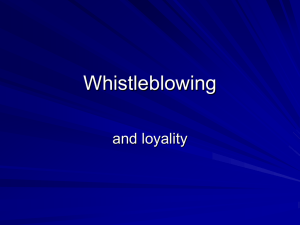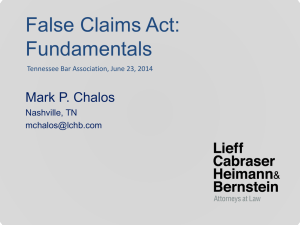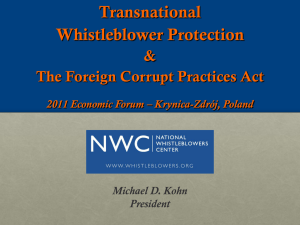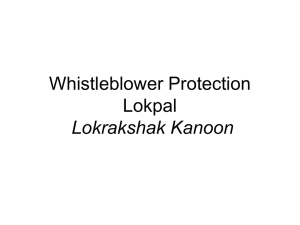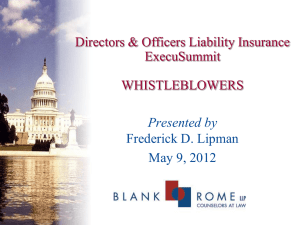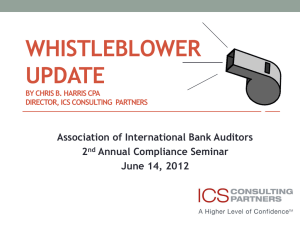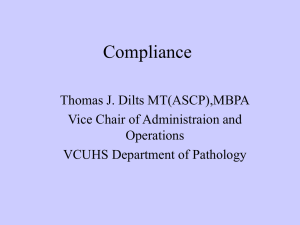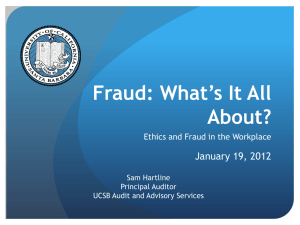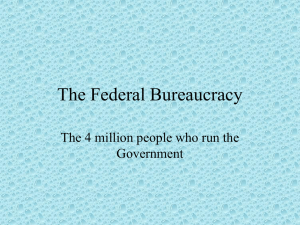William Bourdon
advertisement
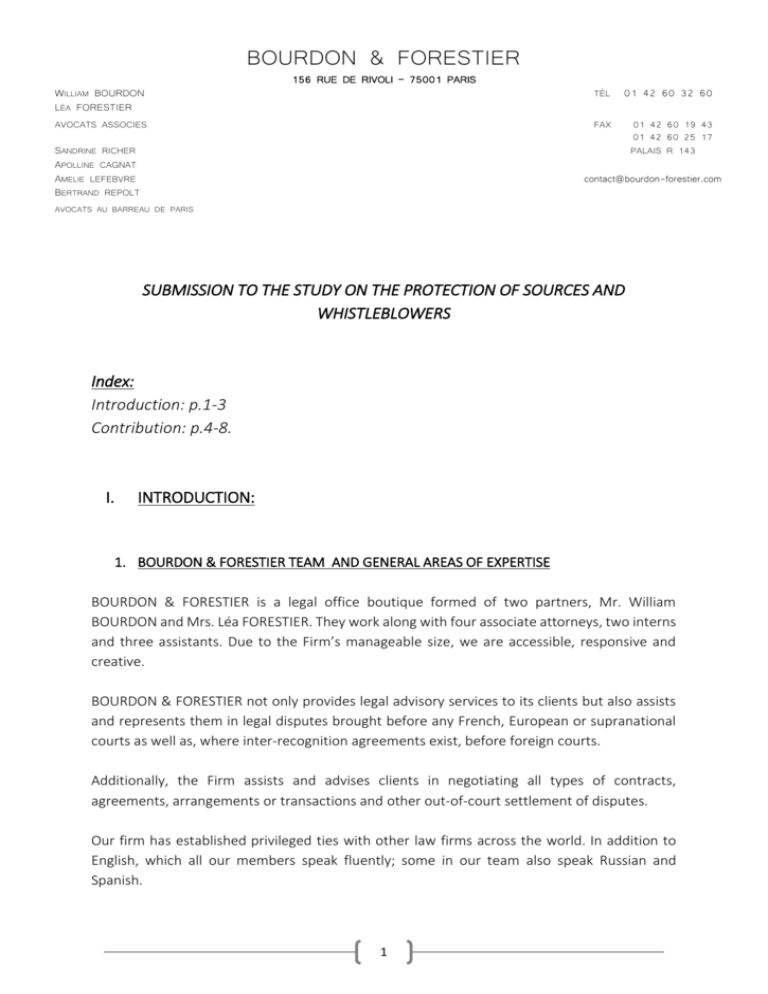
BOURDON & FORESTIER 156 RUE DE RIVOLI – 75001 PARIS WILLIAM BOURDON LÉA FORESTIER TÉL 01 42 60 32 60 AVOCATS ASSOCIES FAX 01 42 60 19 43 01 42 60 25 17 PALAIS R 143 SANDRINE RICHER APOLLINE CAGNAT AMELIE LEFEBVRE BERTRAND REPOLT contact@bourdon-forestier.com AVOCATS AU BARREAU DE PARIS SUBMISSION TO THE STUDY ON THE PROTECTION OF SOURCES AND WHISTLEBLOWERS Index: Introduction: p.1-3 Contribution: p.4-8. I. INTRODUCTION: 1. BOURDON & FORESTIER TEAM AND GENERAL AREAS OF EXPERTISE BOURDON & FORESTIER is a legal office boutique formed of two partners, Mr. William BOURDON and Mrs. Léa FORESTIER. They work along with four associate attorneys, two interns and three assistants. Due to the Firm’s manageable size, we are accessible, responsive and creative. BOURDON & FORESTIER not only provides legal advisory services to its clients but also assists and represents them in legal disputes brought before any French, European or supranational courts as well as, where inter-recognition agreements exist, before foreign courts. Additionally, the Firm assists and advises clients in negotiating all types of contracts, agreements, arrangements or transactions and other out-of-court settlement of disputes. Our firm has established privileged ties with other law firms across the world. In addition to English, which all our members speak fluently; some in our team also speak Russian and Spanish. 1 BOURDON & FORESTIER practices in the following areas: business law, commercial law, criminal law as well as information law, IT law and intellectual and artistic property law. Additionally, it advises and represents clients in matters pertaining to family, personal and property law matters (wills and successions). The Firm has recognized skills and expertise in white-collar crime and corporate criminal law, particularly in cases involving the liability of companies or company managers, staff members or shareholders and charges of misuse of company assets, fraud, money-laundering, possession of stolen goods or other financial crimes, especially in the context of insolvency proceedings. It also appears before the Enforcement Committee of France’s Financial Market Authority. The Firm also advises governments and, when such need arise, assists them in domestic as well as international litigation. 2. WHISTLEBLOWER PROTECTION EXPERTISE William BOURDON was one of the first lawyers to defend whistleblowers in France. William BOURDON defends multiple civil servants, most of the time employed by State departments, as well as private sector employees, most of the time bank employees, to whom he provides legal disputes assistance in front of labor courts and/or administrative courts. He also repeatedly helped them to file moral harassment complaints, and sometimes, he defended them against their old employer who accused them of defamation. Eight years ago, he defended, in an extremely mediatized case, a police commanding officer accused of having collected police files illegally in order to spark a debate that he considered to be a legitimate general concern, on the unlawfulness of such a filing system. He obtained from the criminal court of Paris a particularly lenient court ruling, widely commented and praised. The defense of this police commanding officer led to the publication of various articles seeking to highlight the lack of protection with regard to whistleblowers in France, notably when dealing with civil servants. Regarding other cases pertaining to national security issues, William BOURDON also defends whistleblowers abroad. He is part of an international-lawyers group, focused on the defense of Edward SNOWDEN. He has been involved in this collective reflection work for one year. He defends Mrs. Sabrina DE SOUZA, a former CIA agent currently living in Portugal, under an Italian arrest warrant. Italian authorities claim that she was involved in a rendition operation in Milan; claims that she firmly contests. Regarding whistleblowers in the banking and financial sector, William BORDON has been for the past three years, defending Mr. Hervé FALCIANI – a French-italian citizen and former employee of HSBC in Switzerland – who handed over to multiple French administrations lists – 2 known as the Falciani lists” - of 250 000 names triggering a sizeable number of inquests and fiscal investigations. It made possible not only to reveal the dysfunction of HSBC activity in both France and Switzerland, but also to repatriate billions of euros to the Treasury of various European countries (France, Spain, Germany, etc.). Criminal investigations were initiated against the bank and a bail set at one billion dollars. Hervé FALCIANI paid the high price for this disclosure as he was arrested and detained in Spain on the basis of a Swiss warrant of arrest and extradition request which was ultimately, rejected. In addition, William BOURDON defends Mr. Nicolas FORISSIER and Mrs. Stéphanie GIBAUD, both whistleblowers in the context of the UBS case, and both the cause of UBS FRANCE indictment. UBS FRANCE was forced to pay a one billion dollar bail as well; a court ruling that was recently confirmed by Paris appeal court. Since one year, William BOURDON also defends Attorney Antoine DELTOUR, indicted by an investigating judge of Luxemburg judicial courts for charges of bank secrecy violation, etc. Antoine DELTOUR recently received the European Citizen Award for the way he selflessly revealed the tax ruling system, which is now a major collective focus within European institutions. He defends Mr. James DUNE, a COSMOS company employee who helped revealing the complicity in facts of torture involving his company that eventually led to its indictment. 3. INVOLVEMENT IN LEGISLATIVE WORK François Hollande chose William BOURDON in his 2012 presidential campaign to manage the Human Rights and Public Liberties agenda. This was an opportunity for him to share thoughts with various deputies, senators, campaign staff members of the future French President on the necessity to enhance the legal status of whistleblowers, especially with respect to François Hollande’s political commitments to strengthen anti-corruption policies in France. For the past three years, he repeatedly discussed the potential implementation of mechanisms likely to improve transparency and likely to consolidate the protection of whistleblowers. He also participated in pieces of legislative work in Strasbourg, along with various members of the European parliament. 3 II. CONTRIBUTION 1. WHO CAN CALL HIMSELF A WHISTLEBLOWER The temporary definition retained at this stage for the report is “any person who reports or discloses information of a threat or harm to the public interest in the context of their work-based relationship”. a. Revelation in the public interest: The approach chosen by this definition is welcome as it does not limit the whistleblower - and a specific attention should be given to this point, to the individual who reports a criminal offense as defined by law (and here, the question of the applicable law would render whistleblower’s protection even more random and restrictive). A whistleblower may report an unethical behavior which does not necessarily qualify as a criminal offense but does not appear to be of a lesser interest to the public. An example for this is the LuxLeaks disclosure but Antoine DELTOUR about legal tax avoidance and tax laws that allow companies to channel billions trough Luxembourg through fictitious entities. Although it did not constitute an illegal behavior or a behavior qualifying as a criminal offense as such, these tax rulings are undoubtedly unfair and unethical situations that harm the public interest. Antoine DELTOUR is aged 28 and his social, professional and personal perspectives are much compromised. He is currently under investigations in Luxembourg for having disclosed confidential documents. He faces a trial and possible imprisonment sentence in Luxembourg. His example shows the absolute necessity to grant whistleblower’s protection to individuals who reveal or report illegal offenses but also unethical behaviors which, without being illegal, undoubtedly harm the public interest. b. Information acquired in the course of one’s work? It does not appear necessary to restrict the definition to “work based relationships” as this leaves the door open to various subjective appreciation: should an intern be granted with the protection? What if the whistleblower is an outsider who has himself, received the information from an insider who wishes to remain anonymous? 4 Work based relationship criteria also gives solid ground to companies who wish to claim in judicial retaliation proceedings, that the whistleblower was under an obligation of confidentiality and loyalty – which can be arguably implicitly contained in any work-based relationship without distinction according to the factual specificities of each case. This debate has also its place in France where journalists and whistleblowers have launched a petition against the draft European commission directive that enables companies to act to stop the unlawful use and further disclosure of misappropriated trade secrets. The proposal is now being examined in the European Parliament. The contentious issue is that the text also gives solid legal basis for companies to sue whistleblowers – such as Antoine DELTOUR cited above, but also many from the financial and banking sector (Stéphanie GIBAUD for revealing the illegal practices from UBS, Hervé FALCIANI for revealing tax evasion encouragements by HSBC to certain clients). A re-phrasing of the text should exclude whistleblowers by providing for an exception when the information is in the public interest but this renders the protection very random and in any event, only applicable after examination of the case by a judge. In the meantime, the whistleblower would have already suffered severe retaliation. Comparatively, the US Securities Exchanges Commission has ruled recently that restrictive corporate non-disclosure agreements were not legal in a whistleblower’s protection case, setting a much more encouraging and positive example of efforts to improve corporate transparency and accountability. c. No obligation to report internally prior to the externalization of the information: While the elaboration, improvement and use of internal alert procedures should be strongly encouraged, the status of a whistleblower should not depend on whether the individual did use these internal procedures first or not. Internal reporting procedures depend greatly on the quality and training of the manager in charge. It is not possible to rely entirely on one or two superiors to guarantee the effectiveness of the alert and the protection of the whistleblower. Therefore, the possibility for the whistleblower to go directly to a “third party” (journalist, counsel, NGO, international organization, headquarter even for some behavior limited to subsidiaries) should be preserved. 5 2. PROTECTING A WHISTLEBLOWER FROM RETALIATION Divulgation of secret information – whether classified for national security reasons or information covered by bank secrecy – often bar the whistleblower from any legal protection. Stories published in the news and press about the strong retaliation campaigns launched against whistleblowers and the “illegitimate” character of their disclosure have a very strong deterring effect on potential whistleblowers. a. Whistleblowers and national security Whistleblowers have also encountered many difficulties when revealing information in the public interest that political authorities had classified for National security reasons. As for the Sibel EDMONDS case, court proceedings may be blocked very efficiently by the assertion of “State Secret Privilege”. It has to be kept in mind that such assertion may be done discretionarily by retroactive re-classification. National security whistleblowers often find themselves improperly the subject of retaliatory internal investigations. It is an area of secrecy that makes it even more difficult for whistleblowers to rebalance the power in the whistleblowing/retaliation process as the entities targeted by the whistleblower have to power to set the rules that will be used to retaliate against her/him on the assumption according to which intelligence community agents are submitted to a greater form of secrecy and loyalty than other public officials or civil servants. A striking example is the one of Edward SNOWDEN. The same issue is also central in international organizations where the culture of discretion, loyalty and secrecy on sensitive missions – inherent characteristics to nearly all international missions which have, for the great majority, political implications – are also great deterrents to whistleblowing. b. Whistleblowers and bank secrecy In the same line of ideas, bank secrecy exposes very easily whistleblowers for having revealed information covered by bank secrecy but such secrecy covers almost all the information available. The number of “compliance officers” in the bank sector has exploded in the past 5 years and employees are submitted to very strict scrutiny – any communication exchanged from the workplace, whether private or professional by nature – can be flagged by “compliance”. These 6 efforts, in appearance to guarantee the good conduct of employees and their “compliance” with ethical, professional and banking rules to reassure financial markets notably, is also an extremely efficient way to keep the employees under pressure and discourage any potential reporting on a behavior. Swiss whistleblower Rudolf ELMER - a former employee of Zurich-based bank Julius Baer Group AG - has been convicted in January 2015 -for violation bank secrecy laws. Swiss whistleblower Hervé FALCIANI – a former HSBC employee – has declared that he willing to return to Switzerland to stand trial if he was given assurances that he would not face immediate arrest. The alternative solution, being judged in abstentia, is also an unsatisfactory solution for the effective defense of a whistleblower. 3. HOW TO ENSURE SECURED DIFFUSION OF THE INFORMATION FOR WHISTLEBLOWERS, BOTH INTERNALLY AND EXTERNALLY It is highly important for potential whistleblowers to be absolutely sure of the process they have to go through to relay the information they carry. Indeed, professional entities must organize the creation of a transparent section or unit within the company/administration in charge of advising the employees on the topic of whistleblowers, and, eventually of helping them go through the judicial steps. Such an entity must be independent from management directorate and detached from issues that might arise when reporting on behavior by one’s hierarchy. Moreover, every professional sector must guarantee that even the employee at the bottom of the hierarchy is able to get in touch with an entity that will help him. Indeed, taking into account the disequilibrium of power within hierarchical entities, it is worth mentioning that most of the times, employees do not know their rights, they might not know how to assess the seriousness of the information they have, and, above all, they might be afraid of taking the decision to go through an undefined process. Therefore, the protection of whistleblowers must be systematically included in basic training and information sessions to convey to employees the message that should they be witness of an unethical situation, they will be accompanied in the process. 7 4. INTERNATIONAL INITIATIVES TO INFORM AND PROTECT WHISTLEBLOWERS a. Public actors Even if ideally protective legal initiatives for whistleblowers should be integrated in national law, it is worth beginning with building public international bodies that will make a stand in favor of a legal status for whistleblowers, and raise awareness on this topic. It is worth considering the creation of a special division in relation with the UN High Commissioner for Human Rights specialized on whistleblowers. Proceeding from that idea, international organizations such as the International Labor Organization (ILO) could build a department in charge of assisting international whistleblowers’ cases as well as accepting whistleblower’s judicial pleas. The IMF, the World Bank, and so on, could also build new departments in charge of dealing with whistleblowers. More generally, conceiving an international independent administrative authority, with both funds and enforcement powers in protecting whistleblowers would be the most efficient way to ensure the protection of whistleblowers. Multiplying divisions, departments and international initiatives for the legal protection of whistleblowers, would allow externalizing and spreading the effects of that protection. b. Private actors It is also necessary to encourage private initiatives from the civil society for several reasons: they develop valuable experience and technical skills in whistleblowers’ protection at a local level as well as the international level, they can provide counsel from a strategic and judicial point of view, they can also manage public relations and communication, they can help the whistleblower to remain anonymous and better protect them against retaliation. Indeed, NGOs could be extremely helpful on collecting data, testimonies, and complaints from whistleblowers around the world, as well as on promoting the standardization of whistleblowers protective status and relays in the professional world, and on raising awareness on the topic. Paris, 22/19/2015, William BOURDON. 8
